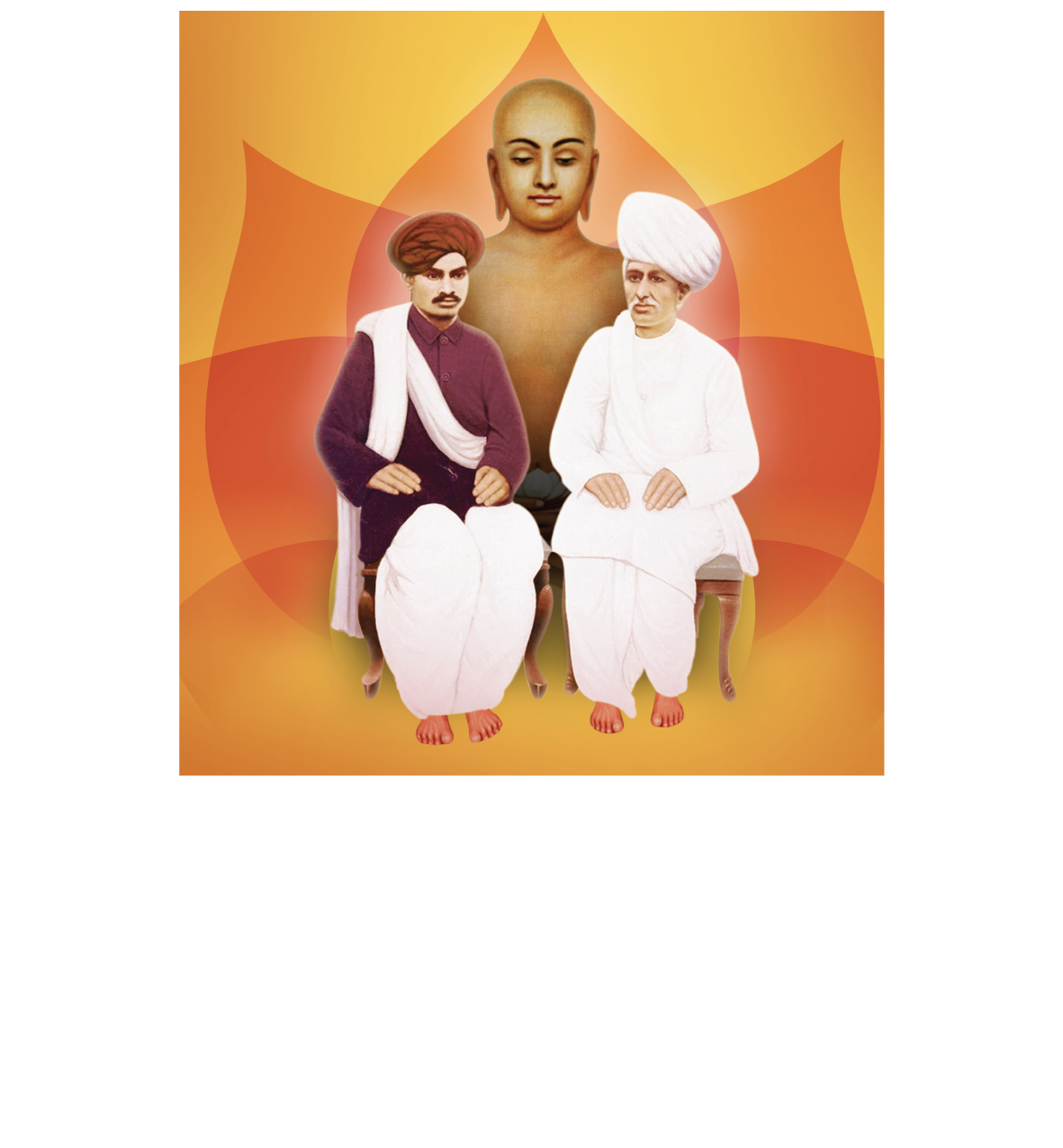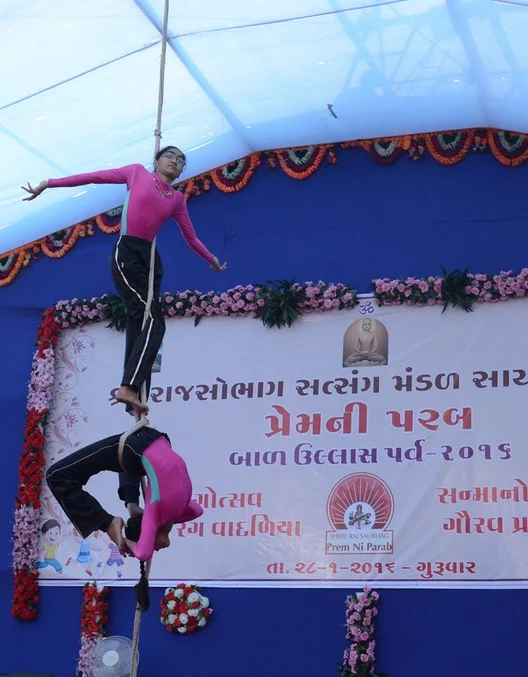Just one month before her exams Renukaben Amreli, a student of LMV College from the town of Muli, gave birth to a beautiful baby girl. With her mother-in-law's support she continued her studies, acknowledging the importance of education. Accopanied by her mother-in-law to look after the baby, she arrived to the surprise of fellow classmates to complete her exams.
Prem Ni Parab - 25,000 students participate in Annual Festival of Sports and Culture
Changing Mindsets
Pujya Bhaishree and Gujarat Minister lay foundation stone of C.U.Shah University Surendranagar
Women's empowerment: Story writing workshop
Women’s empowerment through story-writing workshop
Raj Saubhag Ashram along with Gujarati Sahitya Parishad hosted a story-writing workshop for female writers at the ashram premises between 20th-22nd June, 2014.
The mentors for the 3-day workshop were critic and writer Shri Ramesh R. Dave, ex-collector-Ahmedabad and writer Shri Kirit Dudhar; and professor and head of Hindi department, Uma Arts & Nathiba commerce Mahila College, Gandhinagar and Sahitya Akademy award winner Dr. Bindu Bhatt, with Parul Desai and Pragna Patel of ‘Annie Saraiya Lekhika Protsahan Nidhi’, both of whom took on the task of chief coordinators. The event was conducted by Raj Saubhag Ashram’s Prem Ni Parab (PNP) Educational Project.
Opening Session
Addressing distinguished literary luminaries like president of Gujarati Sahitya Parishad, Dhirubhai Parikh, secretary of Gujarati Sahitya Parishad, Dr. Prafulbhai Raval, Nitin Vagdama, PNP Project Director Shri Chandrakant Vyas and renowned writers from various parts of Gujarat State, Pujya Bhaishree observed: “Though Raj Saubhag Ashram is primarily a spiritual organization, it has the motto ‘service to humanity’ at its core. Pujya Bapuji would often say that we are indebted to the society we live in; and only when we work for the welfare of the weaker sections, can we repay this debt. Imbibing his values, mumukshus would liberally donate to improve education and health, natural disaster relief aid, disabled support and community welfare.
“Generosity can only be cultivated when care-givers are compassionate and sensitive to the need of others. And it is this very compassion that is fundamental to our spiritual growth,” Pujya Bhaishree emphasized.
About 5 years ago, Sahitya Satra (Literature Session) was hosted in Raj Saubhag Ashram premises, and this established a connection with Gujarati Sahitya Parishad (Gujarat Literature Conference).
Pujya Bhaishree explained, “Some people may wonder why does a spiritual institute like Raj Saubhag Ashram support literary activities. There are two reasons for this –
- Progress of a nation or a society is hugely dependent on education, knowledge and literature.
- Spirituality, arts and skills have sensitivity and empathy in its roots. Good literature can be helpful to reach the pinnacle of spirituality.
It is due to literature that Kumarpal Desai, the renowned writer from Gujarat, started studying literary works of the great saint Shrimad Rajchandra. Deeply influenced by his profound words, Kumarpalbhai is now spreading Shrimadji’s message to people worldwide. My own experiences too, corroborate this fact. I am a voracious reader since childhood. While emotional literature sometimes drew tears to my eyes, real life-inspiring stories would motivate me. Such is the strength of literature; good literature leads or inspires change, while ethical and moral stories cultivate good values within the readers. Discrimination between right and wrong can be understood better through the medium of stories.
Jainism advocates four ways of imparting spiritual wisdom:
- Dravyanuyog
- Charnanuyog
- Karnanuyog
- Dharma Kathanuyog.
Holy texts relating heroic deeds of followers are included in Kathanuyog. In the fast-paced modern times, people engaged in worldly affairs may not be too interested if detachment, living a simple and pious life etc., is preached to them. However, when valuable lessons, virtues, profound spiritual truths are effectively conveyed through spiritual stories, they tend to engage the listeners, remaining in their memories long after they have heard them.
Pujya Bhaishree added, “It is a matter of immense pride for Raj Saubhag Ashram to host this workshop, especially because it is for women. Raj Saubhag Ashram has always been active in the field of education and betterment of women’s lives. In order to empower women, we have started the first ever Girls High School and Girls College in Sayla village itself. Here, admission is given either free of cost or at very minimal fees for those who can genuinely afford it.”
Director of Prem Ni Parab project, Chandrakant Vyas said, “Technology has advanced so much that it is now easy to reach any corner of the globe using an airplane or rocket. However, it is becoming increasingly difficult to reach the hearts of people. It is here that literature comes in. Literature makes it easy to connect with people and influence their minds and hearts. The main aim of literature is to spread peace and ignite fraternal feelings among people. My message to all the writers here is, see God in every living being. Sahitya is derived from the word ‘sahit’ – which means to improve human bonds and write literature that is beneficial to all.”
Chief guest Dr. Praful Raval observed, “Prem Ni Parab is an excellent initiative in education. Raj Saubhag Ashram is the only institute in the whole of Gujarat that has successfully conducted such a massive education enhancement project through Prem Ni Parab. Only a pious institute like Raj Saubhag Ashram can have such a non-discriminatory and fair-minded approach.”
Workshop
During the three days, participants were coached on writing styles, encouraged to read more and develop their own distinct style, and follow their passion with confidence and enthusiasm.
Feedback from the participants
Participants were unanimous in their opinion that the workshop was hugely beneficial. They applauded the commitment of the counselors.
One of them said, “The best thing I liked about this shibir is its time management. The experts were with us throughout the shibir and time was utilized very judiciously. Not a single moment was wasted. The session started early in the morning and extended until late evening (with mini-breaks between). The experts were constantly guiding us, they checked and re-checked our written work and gave us objective feedback.”
Another writer was very emotional while sharing her experience. With tear-filled eyes she expressed gratitude towards the experts for kindly guiding them and appreciation for the love and warmth she received from other participants.
They also specifically mentioned how much the quiet and divine atmosphere of Raj Saubhag Ashram helped them focus better. Being women, they hardly ever got a chance to spend three days away in such a peaceful environment single-mindedly focusing on their writing skills.











